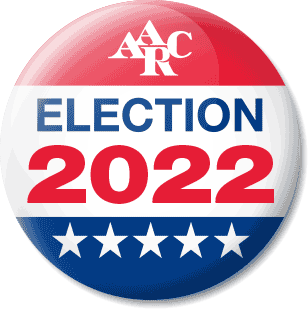President-Elect
Carl Hinkson
Director, Pulmonary Service Line
Providence Regional Medical Center Everett
Member Since: 1994
AARC Activities:
- Director-at-large, 2021-
- Section chair, adult acute care section, 2018-2020
- Special Representative to National Institute of Health Covid-19 Guideline Taskforce, 2020-2021
- Special Representative to American Physical Therapy Association, Clinical Practice Guideline for the Identification and Evaluation of Post-intensive Care Syndrome
HOD Activities:
- Delegate, Respiratory Care Society of Washington, 2012-2017
- Chair, volunteering and mentoring committee, 2014-2017
Affiliate Activities:
- President, Respiratory Care Society of Washington, 2010
- Vice President, Respiratory Care Society of Washington, 2006-2007
- Delegate, 2012-2015
- Puget Sound Chapter President, 2005
- Legislative Committee Co-Chair 2005 2010
- RCSW Communication Committee Chair, 2012-2013
- Special ad hoc Committee on Education, 2011- 2013
- Program Committee Co-chair, 2013, 2015, & 2017
- Student Engagement Committee, 2015-2016
Related Organizations:
- Editorial Board, Respiratory Care Journal, 2014 to 2020
Education:
- Northeastern University, Masters of Science in Respiratory Care Leadership, Boston, MA. 2012.
- University of Kansas, Bachelor’s of Science in Respiratory Care, 2008.
- Highline Community College, AAS, Respiratory Care Program, June 1996.
Publications:
- Miller AG, Roberts KJ, Hinkson CR, Davis G, Strickland SL, Rehder KJ. Resilience and Burnout Resources in Respiratory Care Departments. Respir Care. 2020;Dec 1.
- Ohtake PJ, Lee AC, Coffey-Scott J, Hinman RS, Ali AN, Hinkson CR, Needham DM, Shutter L, Smith-Gabai H, Spires MC, Theile A, Wiencek C, Smith J. Physical Impairment Associated With Post-Intensive Care Syndrome: Systematic Review Based on the World Health Organization’s International Classification of Functioning, Disability and Health Framework. Physical Therapy 2018;98(8):631645.
- LaRoche KD, Hinkson CR, Thomazin BT, Minton-Foltz P, Carlbom DJ. Impact of an Electronic Medical Record Screening Tool and Therapist Driven Protocol on Length of Stay and Hospital Re-admission for COPD. Respir Care 2016;61(9):1137-1143.
- Hinkson CR. Respiratory Therapy is Here. AARC Time. 2020;(4).
Elections Committee Questions:
What do you see as the biggest challenge facing the AARC and what do you recommend to address it?
The AARC is the preeminent professional organization representing respiratory therapists. Despite this, only about 43K of the nearly 200K RTs nationwide are members. During the COVID-19 pandemic the AARC was a reliable source for information for respiratory therapists and other healthcare professions. This effort turned out in many instances to be underutilized as only members had access to some of the forums and information. And many non-members were unaware. There is a perceived lack of value in membership for many RTs despite the many efforts in provided quality education, political advocacy, and professional networking.
And our workforce is becoming more diverse, meaning that we need to update our strategies to connect with RTs. The AARC President needs to address with lack of perception with the non-members by working with the executive office in creating targeting the value of membership to those RTs that do not perceive the value of membership through social media and advertising campaigns, and additional value offering (e.g., membership discount programs.)
Healthcare is changing more rapidly than ever. What do you feel is the main issue Respiratory Care Practitioners are facing, and what are the key solutions that you feel should be addressed to support our profession?
The COVID-19 pandemic has brought respiratory therapists to the forefront of American health care. We have demonstrated our worth and value on the frontlines. That said, there are still several issues that need attention. Despite the movement towards value and quality in health care, RTs are increasingly being asked to do more with less. The pandemic has brought an emotional toll to the field, and we are beginning to see the exodus of the baby boomer generation.
To address these issues the AARC should continue to expend efforts in political advocacy, such as the PACT supporting the telehealth legislation, but also to promote research that demonstrates the value of the RT such as through the Vision grant process. The AARC also needs to focus some effort on building and maintaining resilience through targeted member discounts (e.g., the Hilton offering from last year) and training programs for resilience. We also need to focus efforts on promoting the field of RT to recruit newer and quality people into the school programs to meet staffing needs.
Role-Specific Questions:
How would you, as AARC President, work to move the profession forward?
In order for the Respiratory Therapy profession to move forward we need to communicate more broadly with members and non-member RTs. We need to increase the public’s awareness of respiratory therapists. We played a significant role in the COVID-19 response, and I feel this is the right time to press that advantage to ensure that the population is as familiar with what a respiratory therapist is as they are a physical therapist. We need to continue our political advocacy efforts such as advocating for the telehealth legislation and getting RTs recognized under Medicare Part B to be able to reach our patients in the home. We need to recruit a more diverse workforce that resembles our communities. And lastly, we need to continue to work towards meeting the 2015 and beyond recommendations. As President, I will work with the Board of directors, House of Delegates, and Executive Office to reach these goals.







